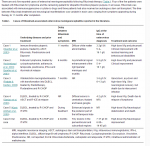Fatal Coxsackie meningoencephalitis in a patient with B-cell lymphopenia and hypogammaglobulinemia following rituximab therapy.
http://forums.phoenixrising.me/inde...e-scared-of-rituxan.37697/page-14#post-607613
A few extra-ordinary things need to be noted about this case.
Firstly, the patient had an autoimmune disease of the blood. I don't know if this is relevant, but it a specific circumstance.
Secondly, and I don't know if this would make any difference, but the patient was given many doses of Rituximab (8 doses during a 10 month period):
Then, she received high-dose (1 mg/kg) IVIG and a total of 8 doses of 375 mg/m2 of rituximab during a 10-month period for severe idiopathic thrombocytopenic purpura.
Also, Rituximab wasn't the only treatment received:
She was initially treated with danazol and corticosteroids.
[...]
At 23 years, she received pneumococcal and meningococcal vaccines and underwent splenectomy for refractory idiopathic thrombocytopenic purpura.
But, most notably, it was after the age of 15 (exact timing isn't specified) that she received Ritiximab, after which "she did well until 27 years of age". It was age 27 years, 12 years after the Riuximab, that she was hospitalised.
By this time, she had developed "marked hypogammaglobulinemia with impaired antibody response and profound B-cell lymphopenia."
If there was an issue with B-cells 12 years after treatment with Rituximab, this raises the question of whether there may have been a deeper and complex underlying immunological issue causing problems, rather than a simple adverse reaction to Rituximab. The B-cell lymphopenia may have been a complication of the Rituximab, but it may have happened roughly 12 years after the infusions, as far as I can work out; The paper doesn't indicate whether her B-cell levels ever returned to normal after the Rituximab, but her clinicians had roughly 12 years during which they could have checked and addressed the issue of B-cells and antibody response not returning to normal.
Is it normal not to check that B-cell levels are returning to normal, after treatment with Rituximab? And to monitor for other blood counts?

